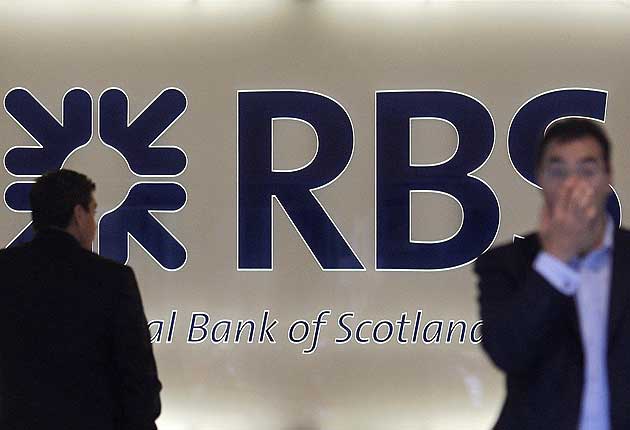A £37 billion taxpayer lifeline was thrown to three of the UK's biggest banks today in an attempt to end the sector's turmoil.
The government will take "significant" stakes in Royal Bank of Scotland, Lloyds TSB and Britain's biggest mortgage lender, Halifax Bank of Scotland, under the historic plan.
But the investment will come with strings attached, including curbs on management bonuses and a pledge to ensure the availability and supply of lending to small businesses and homeowners.
Under the plan, £5 billion will be injected into Royal Bank of Scotland by the Treasury, with a £15 billion share issue by the bank also guaranteed by the Government.
Lloyds TSB and its proposed new partner HBOS will receive up to £17 billion of emergency funding, while the price Lloyds TSB is paying for its rival is also being lowered.
The bail-out move restored some confidence in London shares with the FTSE 100 Index closing more than 8% higher.
The deal has claimed the UK's first major scalps of the banking crisis with the chairmen and chief executives of RBS and HBOS standing down.
Prime Minister Gordon Brown said the bail-out was "unprecedented but essential for all of us".
But Conservative leader David Cameron said the package was "painful and expensive" and represented "the day that the bills came in for a decade of too much borrowing".
He added: "It's not a day to be triumphant, not a day for celebration."
Under the deal, the Government could theoretically end up owning about 60% of RBS and 43% of the combined Lloyds TSB-HBOS entity, depending on how many other investors choose to buy the banks' new shares.
Privately ministers accept they will own "significant" stakes in the banks, helping to control remuneration and dividend policy until the investments are sold.
The banks will stop paying dividends to shareholders until they are in a position to pay back the Government.
Although the FTSE 100 Index rose after the deal was announced, shares in the three banks fell heavily, reflecting the fact that existing investors will see their holdings diluted and dividends curbed.
HBOS dived 28%, Lloyds 14% and RBS closed 8% lower.
RBS chief executive Sir Fred Goodwin - who earned £4.2 million last year and asked shareholders for £12 billion in April to shore up the group's balance sheet - is being replaced immediately, with chairman Sir Tom McKillop retiring from the board next April.
HBOS's chief executive Andy Hornby and chairman Dennis Stevenson are also to step aside when the bank is taken over although their positions were already in doubt as part of the Lloyds TSB takeover.
Chancellor Alistair Darling said the men had waived their contractual entitlements, worth an estimated £2 million for Sir Fred and nearly £1 million for Mr Hornby. "I think they have decided to do the right thing there," Mr Darling said.
Lloyds TSB is raising £5.5 billion of new capital, with HBOS opting for an extra £11.5 billion. Under the reworked takeover deal, HBOS shareholders will receive 0.605 Lloyds' TSB shares for every one HBOS share, valuing HBOS at around £6.9 billion. Previously Lloyds TSB was offering 0.83 shares for every HBOS share.
Barclays said it was not turning to the Government for emergency funding, announcing instead plans to raise more than £6.5 billion from investors to help shore up its balance sheet. The high street bank also said it would not pay a final dividend for 2008, saving the group £2 billion.
Barclays chief executive John Varley warned that rival banks in need of government capital injections would be "constrained in their strategic and operational flexibility".
He suggested Barclays could benefit as bankers quit rivals in the face of Government supervision. Barclays' shares rose 5% today.
HSBC, the UK's other major banking group, has already announced separate capital-raising measures to bolster its UK operation. Its shares firmed 6% today.
The Treasury is to set up a new company to run RBS, Lloyds TSB and HBOS "at arm's length" from the Government, with ministers not involved in day-to-day decisions. But the Government is to appoint three directors to the RBS board and two to Lloyds TSB.
RBS' capital ratio - which compares its share capital with its asset base - is being boosted by more than 4% to 11% thanks to the £20 billion capital boost. The new Lloyds TSB and HBOS entity will also rise to 8.5%. The banks have committed to restoring mortgage lending to at least their 2007 levels as part of the funding deal.
Sir Fred, who has led RBS for nine years, is to be replaced after a "short" handover period by Stephen Hester, currently chief executive of British Land.
Sir Tom said there had been no Government pressure for Sir Fred to stand down.
"This was a board decision," he said. "The board made this decision because it was believed it was the right point in time for a change in leadership."
Sir Tom added that he expected "significant" interest in RBS new shares among investors.
The group's stock plunged 61% in value last week amid the market turmoil, and are worth around an eighth of their value a year ago.
Sir Fred said the measures announced today would help "restore confidence in the financial system" and "enable us to begin lending again". He added that the bank was "entering a new chapter that needed new leadership".
Mr Hester, who is already an RBS board member, said his three priorities would be focusing on customers, reducing the bank's risk, and rebuilding shareholder value.
The Government already controls two significant mortgage lenders, Northern Rock and Bradford & Bingley.
Subscribe to Independent Premium to bookmark this article
Want to bookmark your favourite articles and stories to read or reference later? Start your Independent Premium subscription today.


Join our commenting forum
Join thought-provoking conversations, follow other Independent readers and see their replies